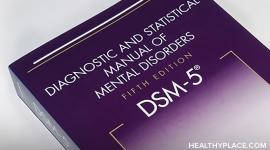Types of Dissociative Disorders, List of Dissociative Disorders

There are four types of dissociative disorders that describe the dissociation associated with amnesia, feeling like the world isn't real, fogginess of identity and other signs and symptoms of dissociation. The four types of dissociative disorders are defined in the Diagnostic and Statistical Manual of Mental Disorders, fifth edition (DSM-5).
List of Dissociative Disorders
The following list of dissociative disorders outlines the four defined disorders:
- Dissociative amnesia – characterized by an inability to remember personal information in a way that cannot be accounted for by forgetfulness.
- Dissociative identity disorder – characterized by more than one identity present in one person
- Depersonalization/derealisation disorder – characterized by a feeling that objects in the environment are changing shape or size or that people are automated; feeling detached from one's body
- Other dissociative disorder not specified – a dissociative disorder that does not fall within the other three types of dissociative disorders
Details on the Types of Dissociative Disorders
Here is a more detailed look at each type of dissociative disorder:
- Dissociative amnesia – this type of dissociative disorder deals with the inability to recall critical personal information. Unlike many other types of amnesia, this one is not associated with physical trauma (such as a blow to the head) but, rather, a psychological trauma. A person with dissociative amnesia will often not remember that trauma that caused this disorder in the first place. Additionally, dissociative amnesia has several subtypes:
-
- Localized amnesia – people with localized amnesia have no memory from a specific period of time, usually around the trauma.
- Selective amnesia – people with selective amnesia remember only parts of what happened during specific timeframes. For example, an abuse victim may remember being on a boat but not the abuse that took place there.
- Generalized amnesia – this rare form of amnesia is when the amnesia encompasses a person's whole life including his or her identity.
- Continuous amnesia – this is similar to generalized amnesia in that the person cannot remember anything before the present moment but the person is also aware of her or her present surroundings.
- Systemized amnesia – people with systemized amnesia can't remember a certain category of information. For example, a person may forget all the specifics about a family member who abused him or her.
- Dissociative amnesia with fugue – dissociative fugue used to be its own diagnosis but now it is considered part of the dissociative amnesia diagnosis. When the dissociative amnesia is associated with confused and bewildered wandering or a journey of some sort, it is known as dissociative amnesia with fugue. In a fugue state, the person is unaware of his or her identity.
- Dissociative identity disorder (DID) – this type of dissociative disorder used to be called multiple personality disorder and is the most famous dissociative disorder. People with DID will dissociate from one identity only to associate with another one, possibly with its own name, gender, age, identity, accent and history. One personality state may not be aware of any others. Other personality states are known as "alters."
- Depersonalization disorder (includes derealisation) – this type of dissociative disorder involves feelings of derealisation: feeling that objects from the physical surroundings are changing in shape or size or feelings that other people are inhuman; and/or feelings of depersonalisation: feeling that one is detached from one's own life and mental processes or that one is viewing one's life as if it were a movie. A person with depersonalization disorder will have persistent and recurrent episodes.
APA Reference
Tracy, N.
(2022, January 4). Types of Dissociative Disorders, List of Dissociative Disorders, HealthyPlace. Retrieved
on 2024, April 26 from https://www.healthyplace.com/abuse/dissociative-identity-disorder/dissociative-disorders-types-list



